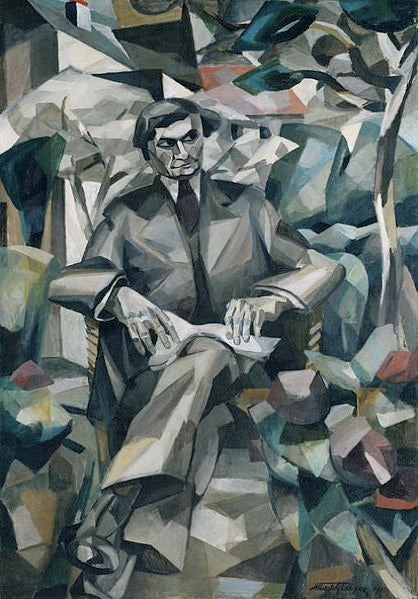Description
The "Portrait of Jacques Nayral" (1911) by Albert Gleizes is an emblematic work that reflects the impact of Cubism on the representation of the traditional portrait. Gleizes, one of the main exponents of this movement, uses a range of techniques that reconfigure the classical notion of portrait, incorporating elements of geometry and fragmentation that characterize its innovative style.
When observing the painting, it is appreciated how the artist displays his mastery in the composition through a design that transgresses the conventions of the portrait. Jacques Nayral, portrayed in an almost frontal posture, seems to emerge from the surface, challenging the typical canvas two -dimensionality. The figure is presented with a nuanced palette, where earth and bluish tones predominate, which establish a connection between the subject and the environment, turning what could simply be a portrait of an individual in a dialogue between the figure and space.
The nayral faction is decomposed in geometric shapes, where the homogeneity of the colors and the simultaneity of the plans generate a multifaceted visual perception. His face becomes an amalgam of facets, playing with light and shadows, which highlights the dynamism and emotional complexity of the character. This technique reflects one of the aspirations of Cubism: to offer multiple perspectives in the same pictorial space, invoking a visual experience that goes beyond the static.
The use of color in this work deserves special attention. Gleizes works with a chromatic range that not only establishes the physical character of Nayral, but also evokes his internal psychology. The blue and ocher soften the contours, while the darkest nuances contribute to give depth to the work. This interaction between color and shape becomes a means to explore the subjectivity of the identity of the portrayed, moving towards a land in which the representation is, ultimately, an interpretation of the state of the soul.
The context of this work is also relevant. Painted in a period where Cubism positioned itself as a revolutionary force in art, the "portrait of Jacques Nayral" was part of a series of explorations that sought to break with academicism and claim a new way of seeing the world. Gleizes, like other artists of his time, enters the portrait as a means to question not only the form but also the content, leading the viewer to reflect on the intrinsic nature of the portrait itself.
In conclusion, the "portrait of Jacques Nayral" by Albert Gleizes is not just a portrait; It is an exhaustive study of form, color and subjectivity. The work is part of a tradition of Cubism that challenges the conventional perception of art, inviting the viewer to participate in a visual dialogue that transcends mere representation. As such, it not only stands as a portrait of an individual, but as a creative exploration of the human being in its complexity and multifaceted reality. This painting, in its rich construction and deep resonance, continues to challenge and wrapping those who stop in their contemplation.
KUADROS ©, a famous paint on your wall.
Reproductions of paintings handmade oil, with the quality of professional artists and the distinctive seal of KUADROS ©.
Art reproduction service with satisfaction guarantee. If you are not completely satisfied with the replica of your painting, we refund your money 100%.

